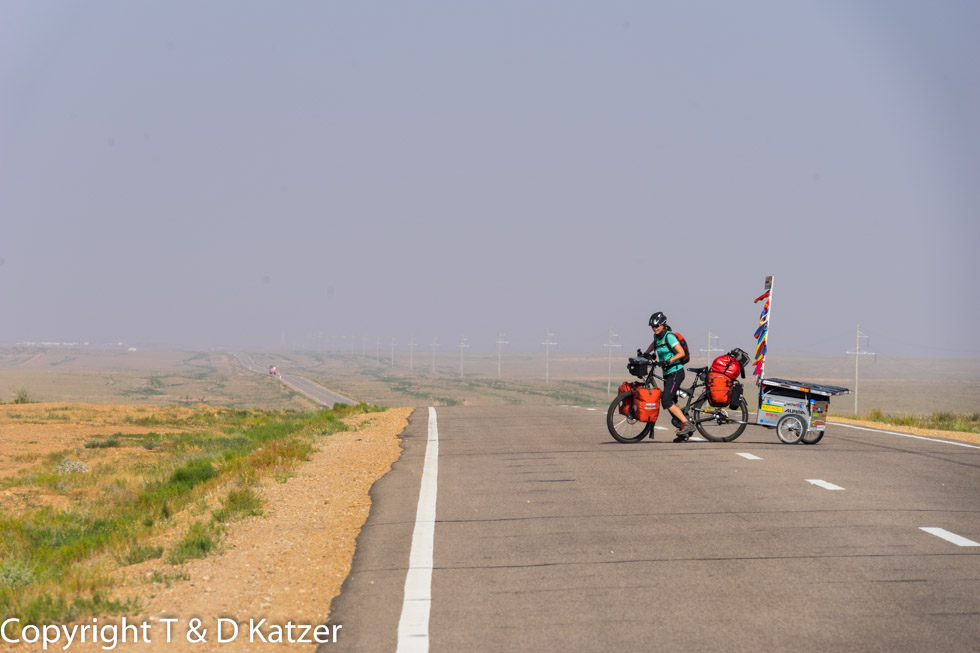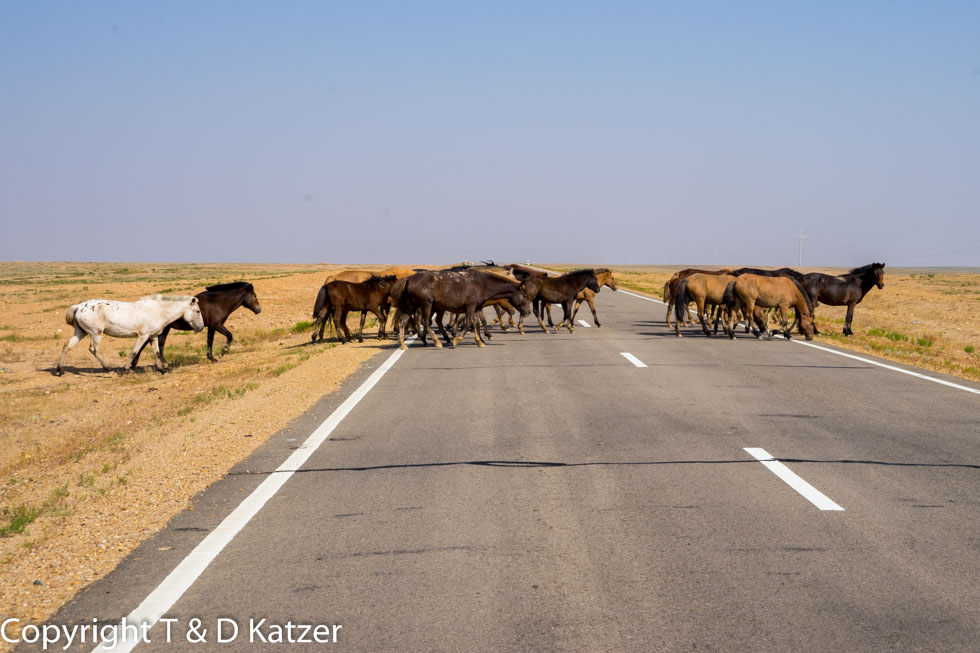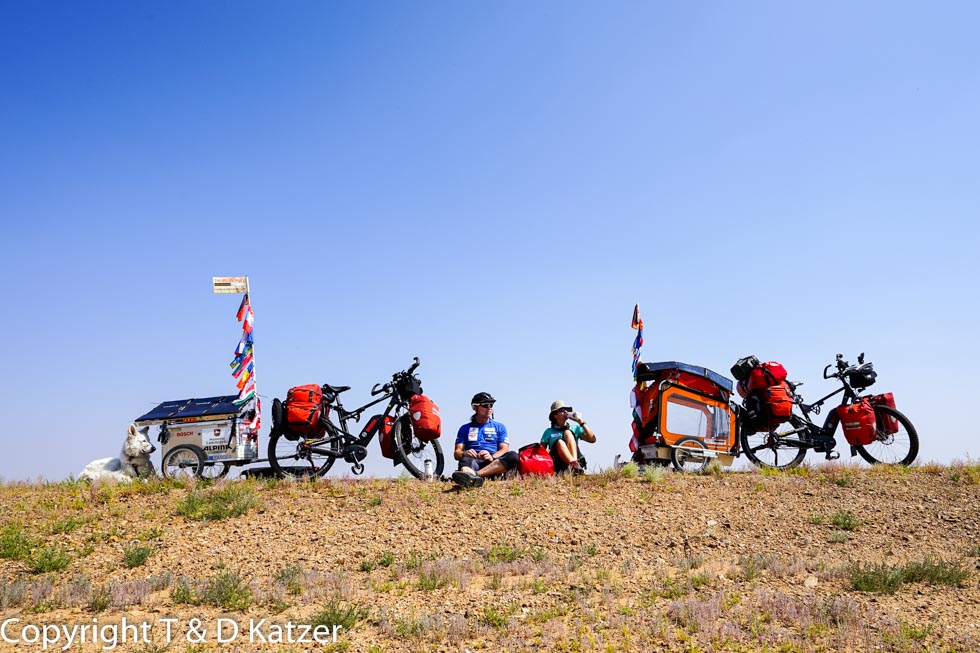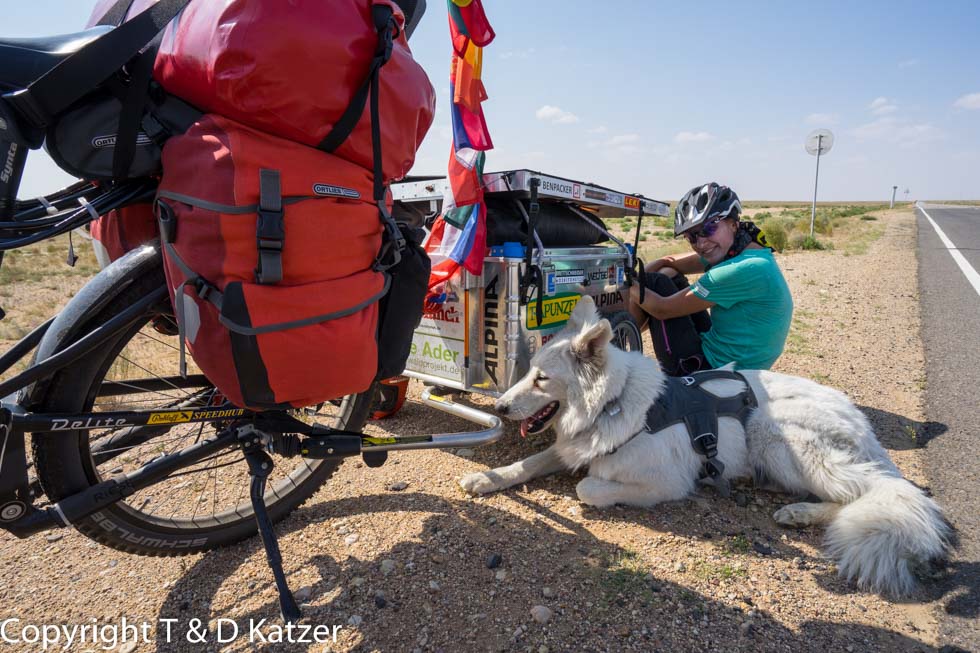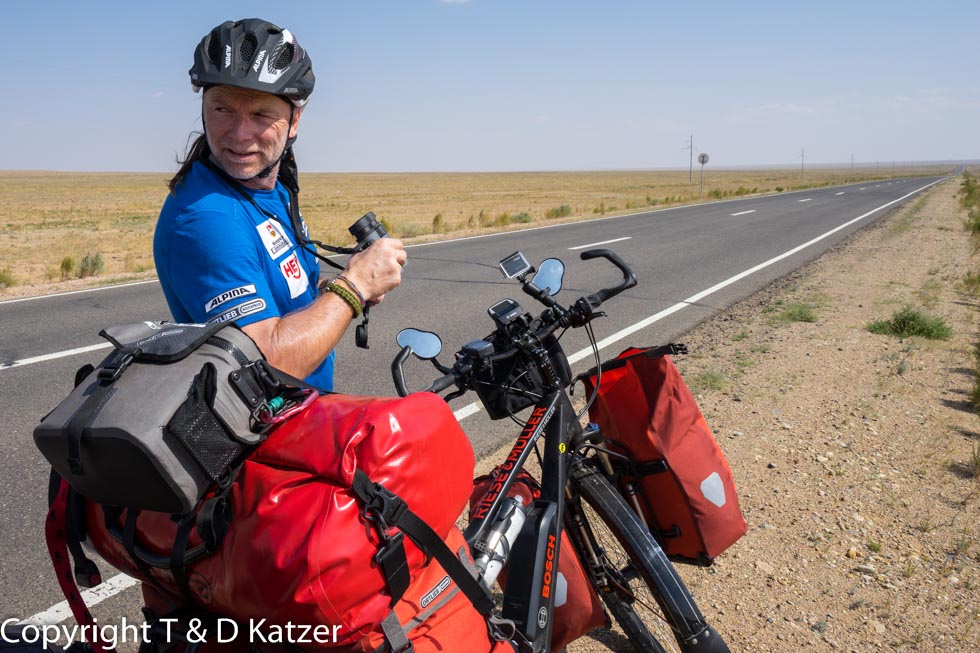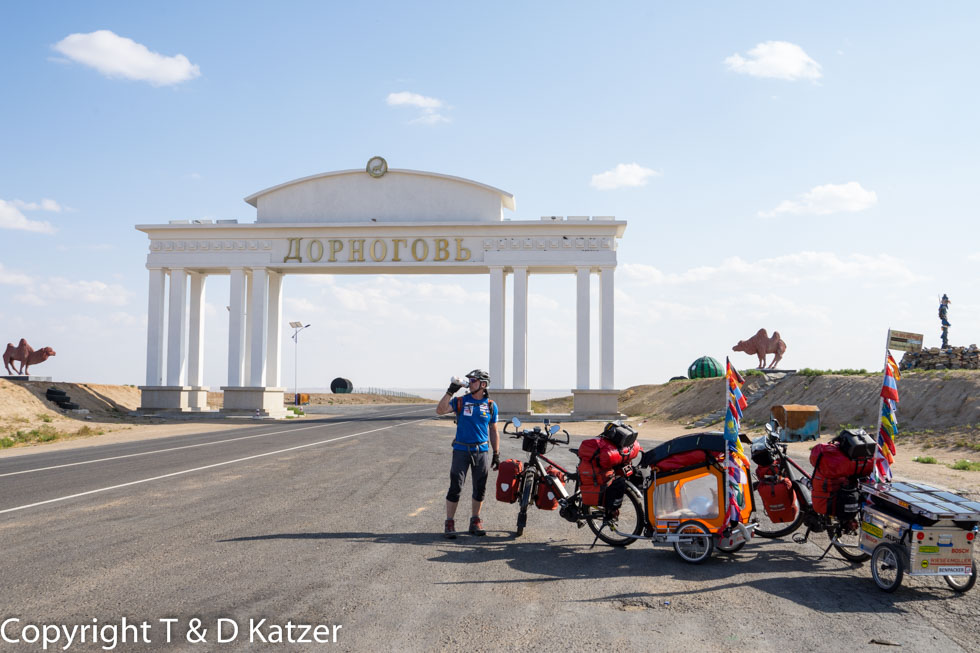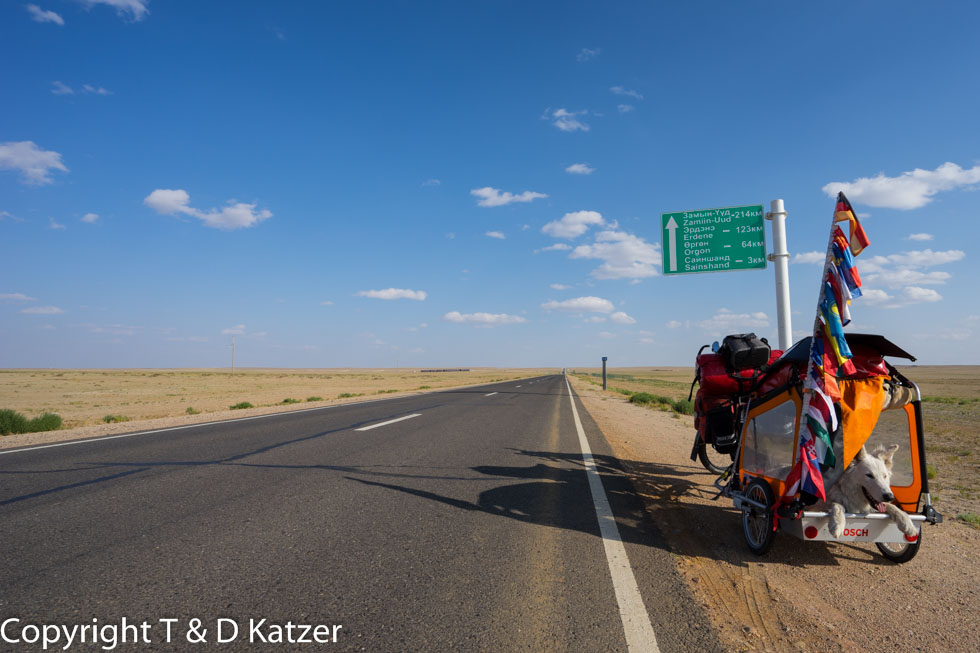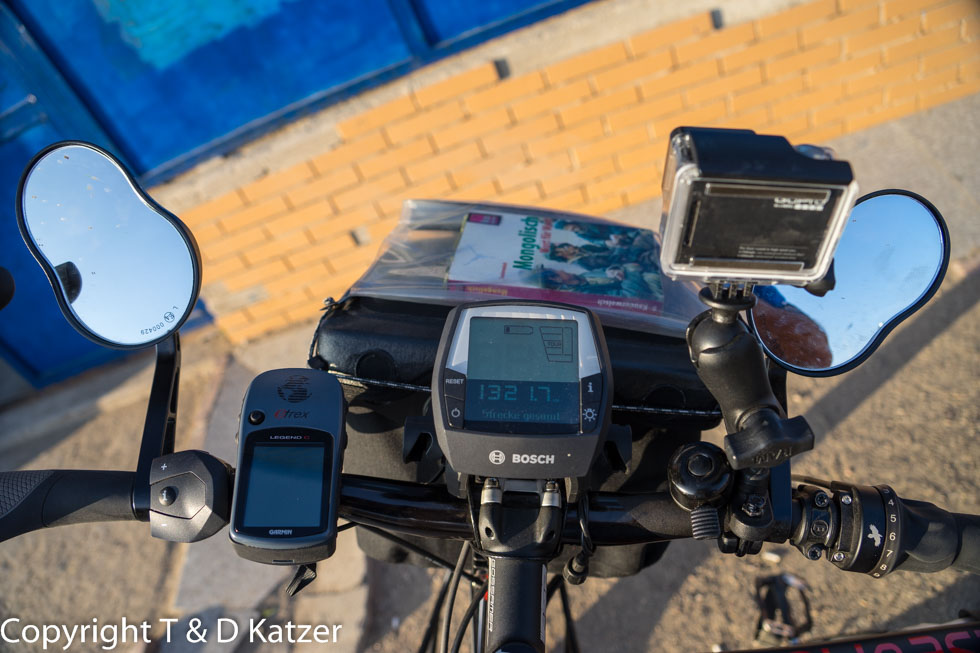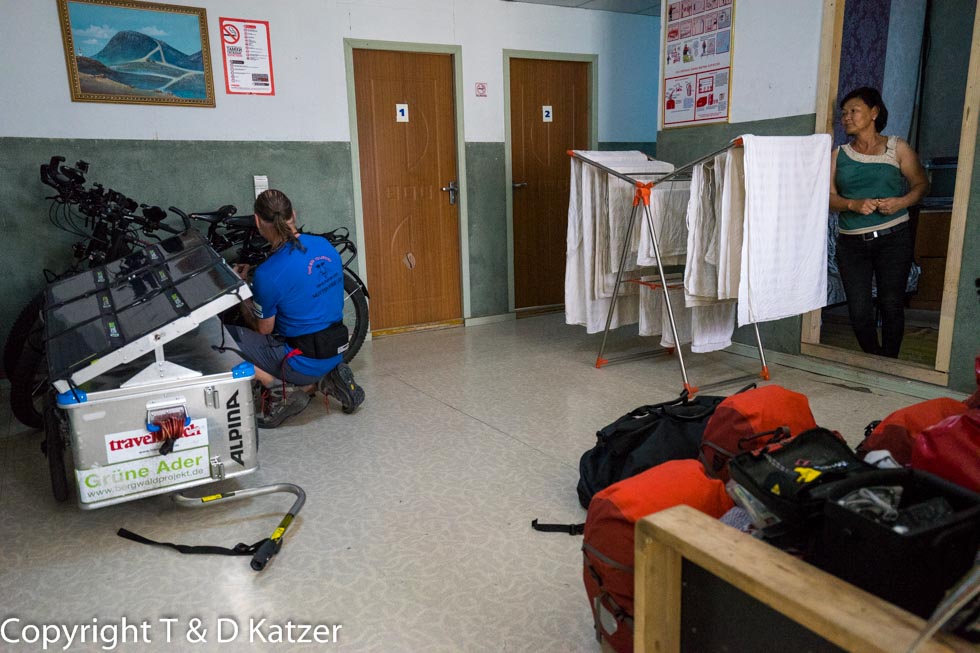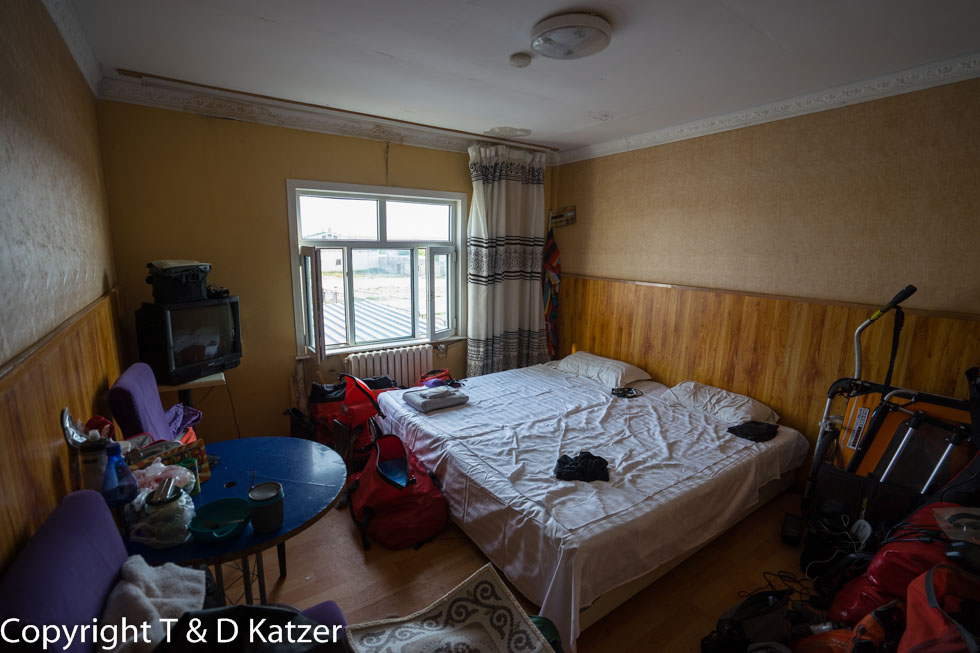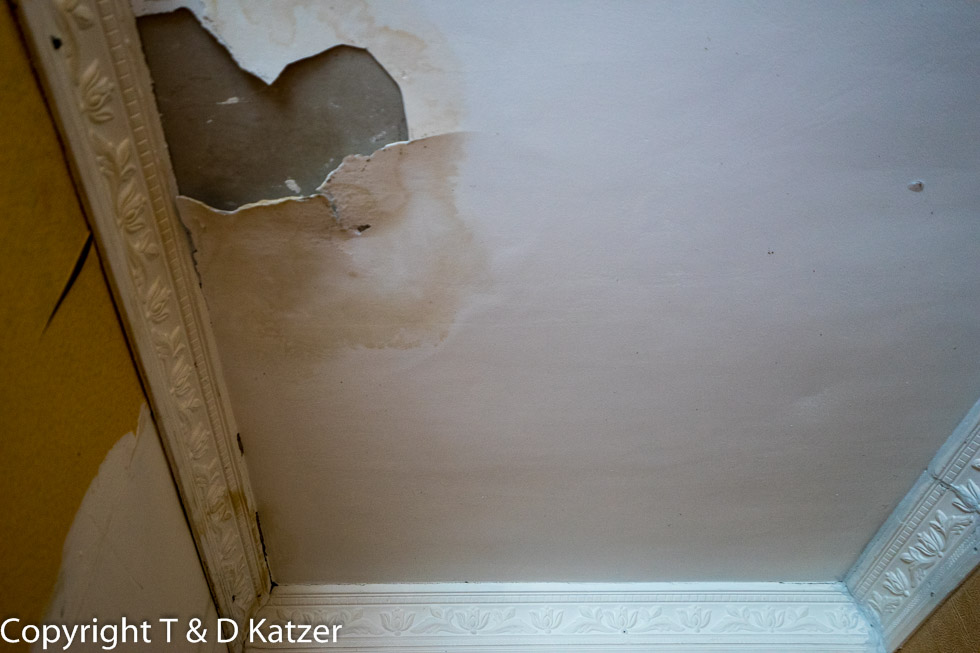
132 kilometers headwind, heat and no human settlement
N 44°54'00.0'' E 110°07'00.0''
Date:
02.09.2015 to 03.09.2015
Day: 66 – 67
Country:
Mongolia
Location:
Sainshand
Latitude N:
44°54’32.2”
Longitude E:
110°08’16.2”
Daily kilometers:
132 km
Total kilometers:
9,041 km
As the crow flies:
118 km
Aver. Speed
24.2 km/h
Maximum speed
35 km/h
Travel time
5:33 hrs.
Soil condition:
Asphalt very good
Maximum height:
1.100 m
Total altitude meters
3.697 m
Altitude meters for the day
151 m
Sunrise:
07:02 am
Sunset:
8:16 pm
Temperature day max:
31 °C
Departure:
09:30 a.m.
Arrival time:
6:00 pm
(Photos of the diary entry can be found at the end of the text).
The joy of having come so far yesterday quickly evaporated during the night. Because the room is on the south-east side of the guesthouse, it is heated by the hot desert sun, so that at 35 °C it is comparable to a sauna. At about 23:00 a few guests moved in and roared around until 2:30 in the morning. Only when I stormed into the hallway, exasperated, and asked as politely as I could to go to sleep, did they suddenly stop their noise. Maybe they thought they were alone in the house? As we didn’t stay in any accommodation during our last trip to Mongolia, but in a yurt, tent and tipi, we are now experiencing a different side of this country.
At 7:30 a.m. we rise from our beds, not for the first time since we left U.B., exhausted. We are still suffering from diarrhea. Ajaci has also been in the toilet runners’ club for days and whines for an early walk. We would also like to spend a day resting here, but that makes no sense given the room temperatures. Above all, we don’t know whether we will make it to Saischand with our batteries. If we break down on the route, we have to charge the batteries with our solar panels and that can cost us two days. But as always, we are confident that we will come across one of the street restaurants or at least a small store. That’s why we don’t want to shy away from the horses just because there is a possibility of having to manage without a loading facility this time.
The extremely friendly owners of the small guesthouse also help us carry our equipment down today. At 9:30 am we are on our bikes. At 31 °C in the shade, the desert wind is still blowing against us today with a force of between three and four. The first few kilometers are slightly hilly under a cloudless sky, then the Gobi becomes very flat, partly stony and the steppe grass is dried out by the sun and the hot wind. As in previous days, herds of camels, horses and goats cross the road. Sometimes they are driven by the nomads. Not on horseback like a few years ago, but often on a moped. The romantic images of this people are increasingly being dispelled by modernity. The Trans-Mongolian Railway still accompanies us, and many an engine driver still greets us with a loud horn, its insistent sound roaring across the steppe until it is lost in seeming eternity.
Although we save energy and only ride in tour mode, i.e. level two of four possible, we make relatively good progress. Tanja keeps close behind me in the slipstream, which gives her an additional few kilometers of range. Battery 1 is empty after 30 km. After 60 km battery 2, we are tired and exhausted due to stomach problems and lack of sleep and after three hours of pedaling against the wind we take a break at the side of the road. Thirsty, we draw the delicious and vital water from our drinking bags. Our stock is falling rapidly. Good thing we took enough of them with us. Especially if we are forced to set up camp for the night in the steppe. We sit down in the sparse shade of our bikes, eat a few muesli bars and recharge our batteries for what lies ahead. Before continuing, I scan the horizon with binoculars. Maybe I can make out a silhouette of a house after all? However, there is nothing to discover apart from desert, sand and steppe.
No roadside restaurant or small settlement where we could charge our batteries appears on the rest of the route either. Vehicles only pass by very rarely. The wind carries the stench of decay from the dead cattle and horses lying by the roadside to us. They inevitably remind us of death and the fact that you can easily die of thirst here. Who would have thought that there would suddenly be no more human settlements in the Gobi Desert? A breakdown would get us into big trouble. I’m praying not to get a flat tire here. That would be a minor disaster. However, the tires have held up well so far. Yesterday, one of the gas station attendants had said that there would be a shelter no later than 26 kilometers after the village of Khar-Airag. Why would the man say something like that? I have no idea. On our travels, we have often had to experience locals feeding us misinformation. Tanja and I almost died of thirst in the Australian outback because of this. That’s why I’m not surprised to have seen nothing but desert for 80 km now.
Battery 3 is empty after 90 km. We use the GoalZero’s solar-charged battery 4, which, as previously described, can be charged with a maximum range of 20 km due to the low capacity of the small GoalZero battery. Because Tanja rides in my slipstream the whole time and her trailer is about 30 kilograms lighter, she gets about 10 percent more distance out of her energy storage. Nevertheless, we also replace her battery every time mine is empty. I will then use the remaining energy from their batteries when mine are all drained. This means that with this energy management we manage to drain all the batteries at the same time, because it makes no sense if Tanja still has a lot of juice in her last battery at the end while mine are all flat.
To save even more energy, we are now only driving in Eco or Tour mode. We discuss whether it makes sense to head for one of the remote little stations on the Trans-Mongolian Railway. However, we would have to bump several kilometers over rough clay and gravel roads to the railroad line, without knowing whether these railroad cabins, which are sometimes visible from the road, are occupied. If not, we would be stuck in the middle of nowhere without the possibility of being able to stop one of the few cars in an emergency.
My current calculated range is around 110 km. According to maps.me (a map program for smartphones), our destination for the day, the town of Sainshan, is probably 130 km away. “How much is left in your battery?” asks Tanja at kilometer 109. “All of them in a minute,” I reply. A little later I put in one of Tanja’s batteries, which according to my display still has about 9 km to go. Although it’s getting pretty tight by now, we remain confident that we can still make it. We reach a mighty concrete archway that arches over the road like a historic Greek building. He announces the province of Dornogov, which lies in the south-east of Mongolia and borders directly on China.
“Let’s take a short breather,” I say. “We reach the city,” says Tanja happily, because the colonnade built on a hill offers a view of buildings around five kilometers away. Walking around the arch of columns, I actually discover a rest house hidden behind an elevation and therefore not visible from the road. “I’ll check it out,” I say and walk to the building, my thighs heavy as lead in the late afternoon sun. “Hello! Hello! Helloooooo!”, I shout, because there isn’t a soul to be seen. I enter the house cautiously because of the guard dogs. “Hello!” I call cautiously because there’s no one in here either. Dirty tables in the dining room bear witness to guests who recently dined lavishly here. “Hellooo!” I call out again, only to hear yawning silence. Suddenly I’m standing in the simple kitchen. A very, very fat woman is lying on a mattress. She is obviously in a deep sleep. A lump of meat weighing around 10 kilograms is rotting away on a kitchen table. A few rays of sunlight falling through the window make it glow bright red. A swarm of flies is delighted with the fantastic food and feasts on it. The sweet smell makes my hair stand on end and my already weakened stomach grumbles and growls unpleasantly. I turn on my heel and run to Tanja. “And?” she asks. “I don’t think they have any power. Could only make out a few car batteries standing around in the dining room. Apart from that, it’s another one of those restaurants where you get a free stomach problem with your meal.” “So we’re moving on?” “By all means. We’ll definitely reach the village we can see from up here,” I reply, and we let our bikes roll downhill against the desert wind. However, we are wrong about the distance, because the houses do not want to come any closer. Now all my power collectors are empty except for Tanja’s last battery. I use your accumulator 3, whose range is shown on the display as five kilometers. As there is a long hill in front of us, Tanja wants to continue during the battery change. “I don’t want to lose any energy by stopping!” she calls out to me. But for some reason she stops 50 meters further on. Fortunately, because according to a road sign, we have to leave the main road and turn right. She would have overlooked that and I wouldn’t have been able to drive after her to point it out because of a lack of energy. “How much further will you get?” I ask. “Seven kilometers and you?” “Five kilometers.” We ask a driver how far it is to Sainschand. “Another kilometer,” he replies, taking a photo of us. “Hurray! Great!”, we rejoice and I would love to blow my remaining energy in turbo mode. After two kilometers there is still no town in sight. Still not after three kilometers. Other drivers, who we stop, again speak of only one kilometer left. And finally, after five kilometers, we reach the town sign. “We’ve made it!” exclaims Tanja happily. “Fantastic!” I share her joy. A passer-by shows us the way to a hotel. “Looks classy,” says Tanja as we park our bikes in front of the Mongolian luxury shed with the last of the energy in the battery. “I didn’t think they’d have a hotel like this in this desert nest,” I say euphorically, finally not having to spend the night in a run-down, half-ruined and dirty place. While Tanja looks after the bikes outside, I enter the elegant house. Although everything here looks quite international, they don’t speak a word of English at reception. “Awtsch boloh uu neg hünij tasalgaa?” (Can I have a double room, please,” I ask. The receptionist shows me the nice, clean room with balcony. “58,000 tugrik” (€26), she says kindly. “Although the price for long-term travelers is critical for the budget, I take the room immediately. Back at reception, I immediately receive the Wi-Fi code. “Where can we store our bikes?” “We have a garage outside.” “Perfect,” I say happily and follow the hotel manager to have a look at the garage. “You can adjust your bikes here,” says the man, pointing to a raggedy wooden crate that any child can get over in no time at all. “Here?” I ask, stunned. “Yes, we have two dogs. They’re in the fence next door. They keep watch.” “But what can your dogs do against a thief if they’re locked in another wooden shed?” “They attack.” “And they get up every time to see why they attack?” I ask incredulously. Without answering my question, he says: “Besides, your own dog will be sitting next to the bikes.” “Our own dog?” “Of course. You can’t take him into the room.” “Our dog is supposed to lie here in the sun all day?” “Of course. Just like our Mongolian dogs. There’s the chain you can tie him to,” he says with conviction, pointing to the one-meter short rusty thing. “Our dog will never be tied to a chain like that. Never.” Shaking my head, I say goodbye to the man and go to Tanja. “No problem, we’ll just go to the hotel down there. Our Ajaci won’t be a chain dog,” she says indignantly.
We let our Riese und Müller roll along the road and stop at the dilapidated building with large red “Hotel” lettering on the front. I’m just putting my bike on the stand when my display shows a ridden distance of 132 km and a range of 0 km. “Unbelievable. Look at this. We’ve just made it this far,” I say to Tanja, pointing at the display.
While Tanja looks after the bikes again, I go into the building and look for the entrance to the hotel. I end up in a supermarket from which I am sent out again. Then I’m standing in front of an ATM. “Where is the entrance to the hotel?” I ask. “Medehgüj”, (don’t know) they shake their heads. Someone comes rushing out of the supermarket and points to a pitted staircase opposite the ATM. “Bajrlaa,” I thank him and climb up. There is actually a corridor from which a few doors on the left and right lead into the rooms. A Mongolian woman with the voice of a chain smoker shows me one of the rooms. It’s dirty, the plaster and wallpaper are peeling off the walls, it smells of smoke and the shower is broken, but we are allowed to park our bikes at the end of the corridor and Ajaci is tolerated. “Can you open the window?” I ask, because the handle is broken. The woman immediately jams the room key into the lock, turns it and lo and behold, the window opens. In an instant, the desert wind blows the stuffy smell of smoke into the corridor. Because Tanja and I are dog-tired and have no energy in our batteries, we are forced to stay. “It’s only for one night. Tomorrow we’ll look for something else,” says Tanja and while I unload our bikes she carries the equipment upstairs. In the meantime, I’m surrounded by people who keep taking photos of me and the bikes. A few drunks also stagger up and touch everything. When a group of children rush over, I don’t think I’m up to the task any more. I stoically unclick the saddlebags, put them to one side for Tanja and dismantle our trailers. I don’t take my eyes off our property for a second. Meanwhile, a melon seller called Roman speaks to me in English. I ask him if he knows of another hotel here. “Bi medehgüj” (I don’t know), he replies and doesn’t miss the opportunity to give me a melon. Then he invites us to spend the night at his home. Because his home is about five kilometers from here and our batteries are empty, we can’t accept his offer. “Well then, come and see us tomorrow,” he says with a laugh.
With the last of our strength, we then carry the dismantled trailers to the second floor. 20 minutes after our arrival, the bikes are locked in the hallway of the accommodation and hidden from prying eyes under a tarpaulin. “Well, that’s not how I imagined it,” I say, barely able to move from exhaustion, lying down on the now freshly covered bed.
After a few slices of white bread with cheese and gherkins from the jar, I leave our accommodation to do the last lap with Ajaci. The street is only sparsely lit. A few street dogs are roaming around. They would love to get into a fight with Ajaci. I chase them off with a few stones. A drunk man approaches me and asks if Ajaci is a wolf. Then he wants to stroke him. “He bites,” I warn him, whereupon he immediately jumps back. This is the only way we can protect our dog from being constantly touched by strangers from morning to night. The unpleasant smell of offal being prepared wafts out of a house. A favorite dish for many Mongolians, a nightmare for me. That’s how different tastes can be. Especially when they come from completely different cultures. I walk on as quickly as possible. A huge rat crosses our path, stops briefly, stands up on its hind legs, looks at us with its googly eyes and disappears into a hole under the house. It has probably fled from the cat, who sits down in front of the hole and waits. His shaggy fur and tattered ears bear witness to the many fights he has survived. “Come here!” a man orders, waving imperiously at me. I ignore him and he looks after me. “We have to be damn careful here,” I whisper to Ajaci. Come and do your business, then we can go back inside.” Ajaci ignores my request because he’d rather spend a few more hours walking through the nocturnal Sainschant…
In the morning, Tanja, who is still not feeling well, has breakfast of white bread with cheese spread and jam. I devour instant noodles and cookies. Not a treat for the palate, but better than catching something again in one of the restaurants. During the morning walk with Ajaci, Tanja discovers a much better, small government hotel just a stone’s throw from our pad. A room there costs 40,000 tugrik. (18,- €) Although we would love to move, we are simply too tired to do so. We decide to stay in our accommodation for another day so that we can cycle to the Khamariin Khiid energy center in the middle of the Gobi Desert tomorrow. The Dutchman Roelof told us about this. “He can’t miss that under any circumstances,” he enthused. “I wonder if there’s a nice place there where I can write down our notes,” I ponder. “Maybe. I hope it’s not too far away. Roman the melon seller from yesterday said 40 kilometers,” Tanja replies. “We’ll see. As we’ve made such good progress over the last few days and it’s only about 230 kilometers to the Chinese border, we have a few days to take a closer look at the region here,” I reply.
The live coverage is supported by the companies Gesat GmbH: www.gesat.com and roda computer GmbH www.roda-computer.com The satellite telephone Explorer 300 from Gesat and the rugged notebook Pegasus RP9 from Roda are the pillars of the transmission.
